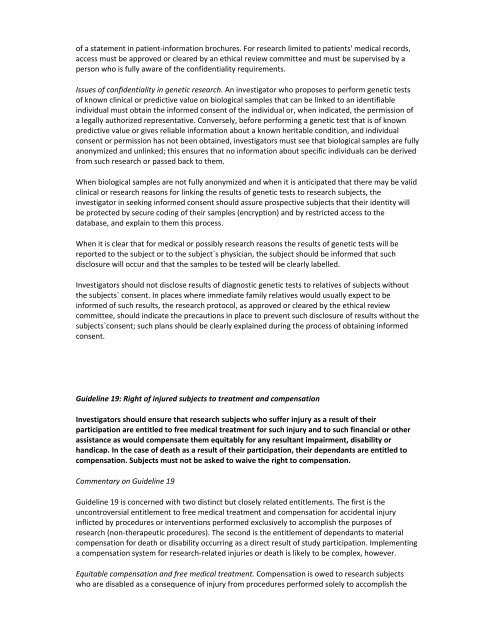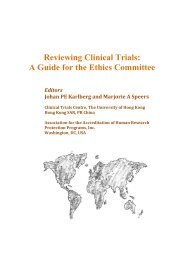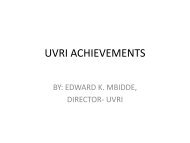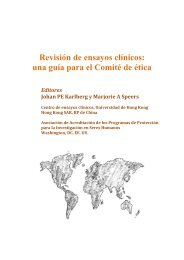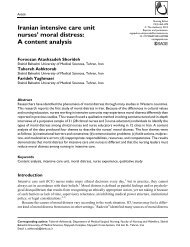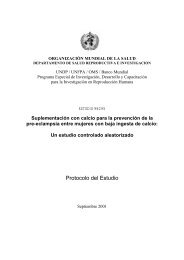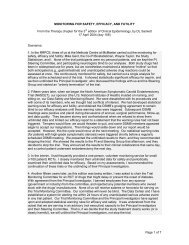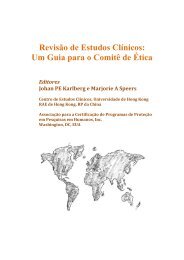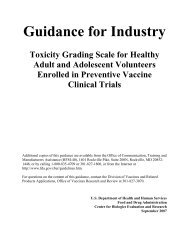CIOMS Guidelines - Global Health Trials
CIOMS Guidelines - Global Health Trials
CIOMS Guidelines - Global Health Trials
- No tags were found...
You also want an ePaper? Increase the reach of your titles
YUMPU automatically turns print PDFs into web optimized ePapers that Google loves.
of a statement in patient-information brochures. For research limited to patients' medical records,access must be approved or cleared by an ethical review committee and must be supervised by aperson who is fully aware of the confidentiality requirements.Issues of confidentiality in genetic research. An investigator who proposes to perform genetic testsof known clinical or predictive value on biological samples that can be linked to an identifiableindividual must obtain the informed consent of the individual or, when indicated, the permission ofa legally authorized representative. Conversely, before performing a genetic test that is of knownpredictive value or gives reliable information about a known heritable condition, and individualconsent or permission has not been obtained, investigators must see that biological samples are fullyanonymized and unlinked; this ensures that no information about specific individuals can be derivedfrom such research or passed back to them.When biological samples are not fully anonymized and when it is anticipated that there may be validclinical or research reasons for linking the results of genetic tests to research subjects, theinvestigator in seeking informed consent should assure prospective subjects that their identity willbe protected by secure coding of their samples (encryption) and by restricted access to thedatabase, and explain to them this process.When it is clear that for medical or possibly research reasons the results of genetic tests will bereported to the subject or to the subject`s physician, the subject should be informed that suchdisclosure will occur and that the samples to be tested will be clearly labelled.Investigators should not disclose results of diagnostic genetic tests to relatives of subjects withoutthe subjects` consent. In places where immediate family relatives would usually expect to beinformed of such results, the research protocol, as approved or cleared by the ethical reviewcommittee, should indicate the precautions in place to prevent such disclosure of results without thesubjects`consent; such plans should be clearly explained during the process of obtaining informedconsent.Guideline 19: Right of injured subjects to treatment and compensationInvestigators should ensure that research subjects who suffer injury as a result of theirparticipation are entitled to free medical treatment for such injury and to such financial or otherassistance as would compensate them equitably for any resultant impairment, disability orhandicap. In the case of death as a result of their participation, their dependants are entitled tocompensation. Subjects must not be asked to waive the right to compensation.Commentary on Guideline 19Guideline 19 is concerned with two distinct but closely related entitlements. The first is theuncontroversial entitlement to free medical treatment and compensation for accidental injuryinflicted by procedures or interventions performed exclusively to accomplish the purposes ofresearch (non-therapeutic procedures). The second is the entitlement of dependants to materialcompensation for death or disability occurring as a direct result of study participation. Implementinga compensation system for research-related injuries or death is likely to be complex, however.Equitable compensation and free medical treatment. Compensation is owed to research subjectswho are disabled as a consequence of injury from procedures performed solely to accomplish the


